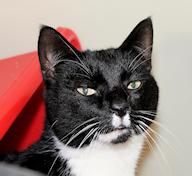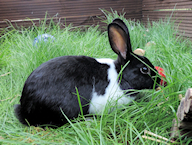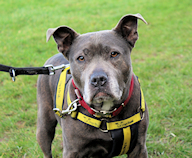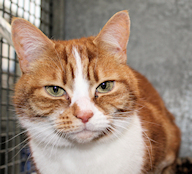




As well as founding the Ealing Animal Charities Fair, Marion Garnett has also, since 2011, written a weekly Animal Rescue column which is published in the West London local newspaper, The Gazette. Columns published since January 2019 are now available online here.
If you would like to see any of the columns published before 2019, please contact Marion directly (see the Contacts page).
Column 7th January 2019
This week we’re featuring Issy and Sally but there’s no photo of Issy as she was invisible. Hiding quietly in a tunnel in her pen, if I hadn’t been told she was there, I would have thought there was only the gorgeous Sally in the pen. It’s a reminder that, when we go into an area, cats are not always visible and, as a result, we have to be careful they don’t get shut in anywhere by mistake. It’s easy to go to a shed or garage and, when we’re not looking, for a cat to slip in, we then close the door, leaving the cat imprisoned inside.
Different organisations have different ways to indicate to customers they are closing, some dim the lights, Wisley Gardens ring a bell but such methods are not foolproof. It’s not so long ago a customer got shut in Waterstones at Trafalgar Square and had to phone out for help. But cats can’t phone for help and, if accidentally shut in, some don’t even make a noise, it can become a serious situation for them.
Cats Protection have initiated a “Look Before You Lock” campaign which encourages people to check garages and outbuildings before closing them to make sure no cats or other animals are inside. They have designed a door hanger (which can be downloaded from cats.org.uk) to place on a shed door reminding us to “Look Before You Lock”.
If we lose our cat, one of the first things we should do is to ask neighbours to
check cupboards, sheds, garages and outbuildings. We also need to be aware they may
have somehow got shut in an empty house. If the cat is microchipped, we need to tell
the microchip database their chip is registered to and make sure contact details
are up-

Now back to Sally and Issy. This lovely pair came into the care of the RSPCA after their owner passed away. When I met Sally, she was shy at first, but quickly became friendly. Issy, a tortoiseshell, hid throughout my visit. According to the RSPCA she is nervous but once you start stroking her, shows signs of coming out of her shell. If you can offer Sally and Issy a loving home together, they are waiting at the RSPCA Cat Adoption Centre, Burket Close, Southall.
Column 14th January 2019
Thank you to all readers who gave presents to their local animal rescue centre for Christmas. The National Animal Welfare Trust (NAWT) centre near Watford filmed a wonderful video of the animals being given their gifts on Christmas Day. If they had chosen the presents themselves, they couldn’t have looked more pleased. On second thoughts, maybe the animals at Watford had been following the example of one of the residents at Trindledown, their sister centre in Berkshire, where a parrot has been ordering his own presents.
It began in November 2017, when a stray African Grey parrot came into the care of
Trindledown, a NAWT retirement home for animals. Despite all attempts to find his
owner, they could not be found and, while he waited, the parrot, Rocco, lived in
the room next to the centre manager, Tracy Waldron. It soon became apparent that
Rocco swore. Tracy says he would only swear when no-
One day his carer came home to find music playing and realised Rocco had learnt how to speak to the virtual assistant, Alexa, to play music and order shopping such as strawberries and ice cream. She now has to check Alexa to see what Rocco’s been up to.
Fortunately, the NAWT know how to take good care of Rocco. Fascinating though these birds are, because of habitat loss and the taking of wild birds for the pet trade, this species is declining and is now considered endangered.
Now back to the NAWT centre at Watford, where the gorgeous Benjamin is waiting for
a home. If rabbits could speak to Alexa, no doubt one of the first things any rabbit
that is confined to a hutch would ask for, is an exercise run. Remember that, as
the Rabbit Welfare Association and Fund (RWAF) say “A hutch is not enough”. The minimum space a rabbit should have is 10 feet by 6 feet with a height of 3 feet. For more
details of what would be on a rabbit’s wish list see rabbitwelfare.co.uk.
space a rabbit should have is 10 feet by 6 feet with a height of 3 feet. For more
details of what would be on a rabbit’s wish list see rabbitwelfare.co.uk.
If you can offer Benjamin a loving home, preferably with a friendly neutered female rabbit, he’s waiting at the NAWT rehoming centre, Tylers Way, Watford by Pass WD25 8WT.
Column 21st January 2019
Numbers are important. Even without realising it, we’re counting all the time – money, calories, how many days before our next day off. But some things are more difficult to count than others. Since 1979, a system has evolved of measuring something that’s not easy to count – bird population. Importantly, the key days for carrying out the count, this year, are this weekend.
Organised by the Royal Society for the Protection of Birds (RSPB), they are inviting
as many people as possible to take part. All you have to do, is spend one hour, at
some time between January 26-
You only count the birds that land in your garden or on your feeder or local park and not those flying over. To avoid counting birds twice, you give the RSPB the highest number you see of each bird species at any one time in the hour – not the total number you count over the hour.
Even if you see nothing, you tell the RSPB. They also want to know what other wildlife, (such as foxes, frogs, hedgehogs, stag beetles), you have seen in your garden or local park in the past year and roughly how often.
Using this information, the RSPB creates a “snapshot” of bird numbers across the UK and monitors the changing numbers in their population.
If you would like to take part, see the details and submission form at rspb.org.uk.
A dog’s capacity to count may be limited but numbers or frequencies matter to an animal in a kennel. Aspects such as how many walks they get, how often they are fed and how long they have to wait for a home all affect their quality of life. So far, after coming into Dog’s Trust’s care when her owner passed away, Tara’s been waiting 75 days for a home.
 With Dogs Trust staff, I accompanied Tara, a gorgeous Staffordshire Bull Terrier,
on a walk round their field – if we’re counting time, this was one hour of bliss,
for me and, hopefully her. She was a total delight. We were, however, careful about
meeting other dogs, as Tara is unsure of them -
With Dogs Trust staff, I accompanied Tara, a gorgeous Staffordshire Bull Terrier,
on a walk round their field – if we’re counting time, this was one hour of bliss,
for me and, hopefully her. She was a total delight. We were, however, careful about
meeting other dogs, as Tara is unsure of them -
Column 28th January 2019
This year’s Ealing Animal Charities Fair is fast approaching and we’re delighted
to share the news that, for the first time, one of the speakers at the Fair will
be Dr Alison Cronin, Director of the world-
Alison will be at the Fair representing her late husband’s charity, the Jim Cronin
Memorial Fund (jimcroninmemorialfund.org) which works to relieve the suffering of
non-
Another first in the animal welfare world is the world premiere on January 31 at St James Church, Piccadilly of the musical work “Animal Requiem” by Rachel Fuller (wife of The Who guitarist Pete Townshend) featuring the Royal Philharmonic Concert Orchestra and Alfie Boe. This work has been created in order to honour animals we have loved and lost and also as a memorial for all animals across the world affected by cruelty, negligence and abuse.
Before the concert, members of the audience will be invited to light a candle in
memory of an animal. If, by the time you read this, it’s too late for you to get
a ticket, all is not lost. The intention of Rachel Fuller is to make the orchestral
and choral score of “Animal Requiem” available for any institution so that it can
be performed by others. If you’re in a position to do so, maybe think about arranging
for it to be performed at a venue near you. Or you can order an album at animalrequiem.com.
If you’re in a position to do so, maybe think about arranging
for it to be performed at a venue near you. Or you can order an album at animalrequiem.com.
Finally, don’t let’s forget our animal who needs a home this week. Biscuit was snuggling up to the heater when I met him at the National Animal Welfare Trust rehoming centre near Watford. If you would like Biscuit to snuggle up to you instead, see nawt.org.
January 2019

Although the information given here is, to the best of the organiser’s knowledge and belief,
correct, the organiser reserves the right to make alterations and amendments, as necessary.
| Groups 2025 |
| Map |
| Car parking |
| Subject Index |